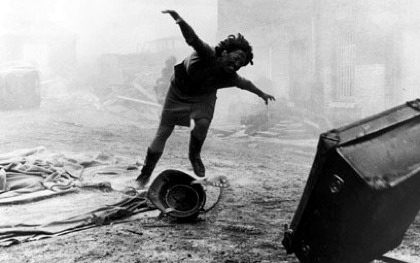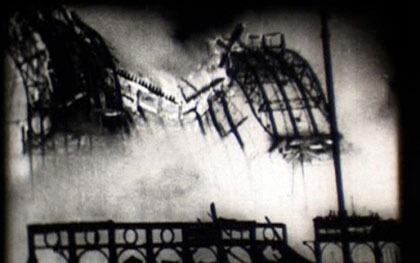Review / Archive film
London’s burning:
The War Game and Black Umbrella

Peter Watkin’s The War Game
At an East London working-men’s club, Peter Watkin’s 1966 vision of a nuclear attack screened alongside Louis Bernassi’s new montage of burning buildings. Frances Morgan reports on an evening of fire, fury and salvaged prints
’Abandoned Archives and Forgotten Histories Remembered’
Bethnal Green Working Men’s Club, London, UK
1 February 2011
The setting of tonight’s screening of Peter Watkins’s 1966 drama-documentary The War Game feels eerily authentic. In an East London working-men’s club, the monochrome flicker of a film commissioned and then banned by the BBC lights up a huddled audience, many seated on the floor. The loudly whirring projector and constant crackle and hiss create an uneasy background of interference to the British voices on the screen narrating a near-future nightmare in which the country is devastated by nuclear attack.
But The War Game’s hell has not materialised, and tonight’s screening is about rediscovery, not forewarning; we are a long way from the tense era in which a film about nuclear war could be called “the most sickening in the world today and one that the public should never see”, as The War Game was by one newspaper critic. Presented by local film library Close-Up in a programme of ‘Abandoned Archives and Forgotten Histories Remembered’, Watkins’s film is literally scavenged from the past – the curators found a discarded print in a stockpile of old film – and presented as an historical artefact.
It’s hard to decide whether this analogue atmosphere intensifies The War Game’s impact or softens it with nostalgic fuzz. At first it seems the latter, as citizens of several small towns in Kent – played, as in the director’s earlier Culloden, by local non-professionals – prepare for a nuclear attack with sandbags, rifles and garden shelters. But as the inadequate preparations give way to death for many and grim survival for a few, Watkins’s vision is anything but quaint.
The Bomb may have faded from the collective consciousness, but the fear of how humans might function during and after a disaster is never far from the surface of our imaginations. In The War Game the veneer of organised society is seared away and trust in protectors is dismantled: establishment talking heads pronounce platitudes, police constables carry out mercy killings and – as anarchy descends – executions. There are few of the heroic gestures that redeem disaster movies: the people in The War Game, who believed they would be looked after, react for the most part with numbed, shattered abjection. Watkins’s anger at their fate has not been muted by the passage of time – perhaps it’s made rawer by the roughened quality of the film stock.

Louis Bernassi’s Black Umbrella
Louis Benassi’s short Black Umbrella strikes a contrasting note. Found footage from the 1930s to the 1950s of London fires – apparently used as training films for firefighters – is projected on three screens, a triptych of aestheticised disaster in which smoke pours from windows and flames attack Crystal Palace. Accompanied by a live soundtrack of rolling piano and double bass, the fires become formally beautiful, as Benassi adds more recent footage of a woman with the title’s umbrella.
The image that lingers, however, is not the mystery woman but what looks like a factory burning after a Blitz attack. Coming after The War Game’s devastating firestorms, the image has an almost mythical intensity, like a collective memory of destruction, from the Great Fire to imagined apocalypses to come.
See also
The Miners’ Hymns reviewed by Nick Bradshaw (July 2010)
Muck and brass: Bill Morrison and Johánn Johánnson talk to Nick Bradshaw about their archive-remix tribute film The Miners’ Hymns (July 2010)
We have always recycled: archivist Rick Prelinger on the rise of ‘archive fever’ (March 2010)
Not forgotten: Adania Shibli on Sarah Wood’s memorial to the lost Palestinian Film Archive, For Cultural Purposes Only (November 2009)
Man on Wire reviewed by Catherine Wheatley (August 2008)
Decasia reviewed by Tony Rayns (December 2003)
Raising hell: Mark Kermode argues for a key scene to be restored to Ken Russell’s censored film The Devils (December 2002)
